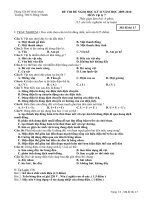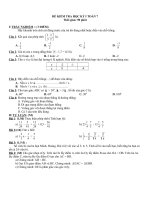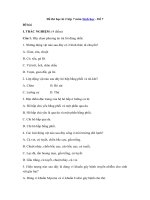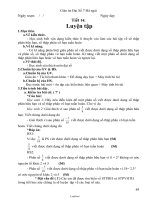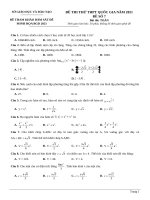De 7
Bạn đang xem bản rút gọn của tài liệu. Xem và tải ngay bản đầy đủ của tài liệu tại đây (67.84 KB, 5 trang )
ĐỀ KIỂM TRA CHẤT LƯỢNG HỌC KÌ II
MƠN : TIẾNG ANH LỚP 8
PART A : LISTENING
I. Listen to Nguyen talking with his friend Phong. Tick (√ ) to decide whether statements
below are true (T) or false (F). You will listen TWICE. ( Review 3- Listening)
T
F
0. Singapore is really as clean as it’s advertised.
√
1. Phong was told of some environmental rules before he
started his tour.
2. People would be fined if they littered.
3. You would have to pay $200 if you spat out chewing
gum in the street.
4. Singapore uses the radio to tell people what they
shouldn’t do in public.
5. Teachers are taught how to behave at school and in the
family.
II. Listen to the passage and then complete each blank with one or two correct words. You
will listen TWICE. (Skills 2 – Unit 10)
1. Energy is fundamental to______________.
2. People who live in______________ areas have to gather wood for_________.
3. For many people living in rural areas, ___________is the largest energy resource available.
4. The main use of biogas is for__________and heating.
PART B :LANGUAGE FOCUS
I. Choose the best answer A, B, C or D to complete the sentences.(2points)
1. Americans rarely shake hands to say goodbye, except___________ business occasions.
A. during
B. at
C. on
D. in
2.__________ at someone is usually considered rude.
A. Point
B. To pointed
C. To pointing
D. Pointing
3.The most common way of attracting someone’s attention is by __________.
A. waving
B. to waving
C. to wave
D. wave
4.Lien told me that ___________ a biology teacher.
A. she wants to become
C. she wanted to become
B. she will become
D. she wanted becoming
5.We reminded Lily_________ late for our appointment the next day.
A. to be not
B. not to be
C. to don’t be
D. don’t be
6.We _____________ with each other by mobile phone in 2050.
A. won’t be communicating
C . aren’t communicating
B. haven’t communicated
D. aren’t going to communicate
7.The teacher said we___________ a week off on the occasion of the International Labor Day.
A. will have
B. didn’t have
C. have
D. would have
8.Tomoko and Kiko said that they ___________ cycling the day after the next day.
A. will go
B. have gone
C. would go
D. has gone
9. While I …………the performance, I met one of my old friends.
A. watched
B. was watching
C. watch
D. am watching
10. You should buy the blue sweater. It suits you ………..than the red one.
1
A. good
B. well
C. better
D. the best
II. Supply the corect tense or form of the verb in parentheses.
1. Lan and her sister are in the bookstore now. She (look) _________ for a craft kit.
2. My mother is hooked on (make) ________________ spring rolls at Tet.
3. This test must (do) ________________ carefully.
4. Their grandparents (live) __________________ in this village since last year.
5. We should (respect) _____________________old people
PART C : READING
I. Fill in each blanket with a suitable word from the box to complete the passage about
the causes of visaul pollution .
includes – many – kind – examlple
Visual pollution can happen outside or inside your house.
When you are in the street, do you look around and see too __(1)__ telephone poles, overhead
power lines or advertising billboard ? This is known as __(2)__ ‘negative visual environment’,
and it causes visual pollution. For many communities, visual pollution also __(3)__ uncut
weeds, graffiti, litter, and even badly cared-for buildings.
This __(4)__ of pollution can be present in your house, too. If you dump clothes or school
things on the floor, it causes visual pollution. A room with too much furniture placed in an
untidy way is another __(5)__ of visual pollution in the house.
You may not know that when you go out without wearing appropriate clothing, you can also
cause this type of pollution.
1.____________, 2.____________, 3.____________, 4.____________, 5._______ _____,
II. Choose the best option (A, B, C or D) to complete the following passage .
An American, Charles D. Seeberger, produced the first commercial moving staircase to
transport people in the 1890s. He called this ___(1)____ an ‘escalator’, taking the name from
the Latin word ‘scala’ which means ‘ladder’. Escalators move people up and down short
___(2)____. Lifts do the same, but only move a small number of people. Escalators have the
capacity to move a lot of people at the same time, and they can be replaced in the same space as
one ___(3)____install a staircase. A non-functioning escalator can be used as a normal
staircase, whereas many other conveyances become ___(4)____when they break down.
Towards the end of the nineteenth century, cities were becoming more crowded and the first
escalators were ___(5)____at railway stations and in big department stores so that people could
move about more quickly. Today we see escalator everywhere.
1. A. creator
B. invention
C. exploration
D. revolution
2. A. distances
B. directions
C. measurements
D. lengths
3. A. should
B. must
C. will
D. might
4. A. useful
B. unused
C. useless
D. uselessly
5. A. built
B. designed
C. produced
D. advanced
III. Read the passage and do the tasks bellow.
THE GREAT HANSHIN EARTHQUAKE
The Great Hanshin earthquake, or the Kobe earthquake as it is more commonly known
‘overseas’, was an earthquake in Japan that measured 7.3 on the Japan Meteorological Agency
magnitude scale. It occurred on January 17th, 1995 at 5:46 a.m in the southern part of Hyogo
Prefecture, and lasted for approximately 20 seconds. The epicentre of the earthquake was on the
northern end of Awaji Island near Kobe, a cosmopolitan city of over 1.5 million people. A total
of 6,434 people, mainly in the city of Kobe, lost their lives. Additionally, it caused
2
approximately ten trillion yen in damage. It was the worst earthquake in Japan since the Great
Kanto earthquake in 1923, which claimed 140,000 lives.
Questions :
1. The word ‘overseas’ in the text is closest in meaning to ____________.
A. abroad
B. at sea
C. by sea
2. The word ‘occurred’ in the text is closest in meaning to ____________.
A. ended
B. happened
C. started
3. When did the Great Hashin earthquake occur?
__________________________________________________________________________
4. Where was the epicentre of the earthquake ?
__________________________________________________________________________
5. Was it the worst earthquake in Japan since the Great Kanto earthquake in 1923 ?
PART D : WRITING
I. Rewrite the sentences so that it means the same as the first. Use the word in brackets.
You may need to change the word.
1. “ People will soon communicate using telepathy in 50 years’ time” Phuc said
Phuc said that __________________________________________________________
2. Alexander Graham Bell invented the telephone in 1876.
The telephone __________________________________________________________
3. There was a loud noise next to my door last night so I couldn’t sleep.
Because there was _______________________________________________________
4. This factory doesn’t treat its waste well so there is a lot of water pollution
If this factory treated______________________________________________________
5. The tsunami happened. Many people in this area became homeless.
The tsunami made ________________________________________________________
II. Rearrange the words/phrases given to make complete sentences.
1. aliens/ wanted to know/ Dean/ could communicate/ if/ verbally/.
________________________________________________________________
2. decided/ We/ have/ to stay/ for/ in/ Ho Chi Minh city/ three more days/.
_______________________________________________________________
3. use/ abbreviations/ Teenagers/ often/ when/ texting/.
________________________________________________________________
4. Phuc/ learning/ a new language/ will/ this time/ be/ next year/.
________________________________________________________________
5. Tom/ inhabitants/ might travel/ thought/ of Venus/ by buggy/.
________________________________________________________________
III. Make sentences using the words and phrases given:
1. what/ you/ like/ it?/
………………………………………………………………………………………
2. I/ use/ English/ everyday,/ people/different/countries./
………………………………………………………………………………………
3. He/ not/ say/ anything/meeting/ last week.
………………………………………………………………………………………
4. Lan/ enjoyed/ chat/ the phone/ her friends./
………………………………………………………………………………………
5. Nam/ will/ not/ able/ go/ cinema/ at/ 3.30 p.m./ this Monday/
………………………………………………………………………………………
3
ĐÁP ÁN MÔN : TIẾNG ANH - LỚP 8
PART A. LISTENING
I. Listen to Nguyen talking with his friend Phong. Tick (√ ) to decide whether statements
below are true (T) or false (F). (Review 3- Listening)
1T 2T 3T 4F
5F
II. Listen to the passage and then complete each blank with one correct word. You will
listen TWICE. (Skills 2 – Unit 10)
1. human beings 2. mountainous/fuel
3. biogas
4. Cooking
PART B. LANGUAGE FOCUS
I. Choose the best answer A, B, C or D to complete the sentences. (2points)
1. C
2. D
3. A
4. C
5. B
6. A
7. D
8. C
9. B
10.C
II. Put the correct form of the verbs.
1. is looking 2. making 3. be done
4. have lived
5. respect
PART C. READING
I.
1. many
2. a
3. includes
4. kind
5. example
II.
1. B
2. A
3. D
4. C
5. A
III.
A.
1. A
2. B
B.
1. (The Great Hanshin earthquake /It occurred) on January 17th, 1995 at 5:46 a.m
2. (The epicentre of the earthquake/It was) on the northern end of Awaji Island near Kobe
3. Yes./Yes, it was.
PART D. WRITING
I. Rewrite the sentences so that it means the same as the first. Use the word in brackets.
You may need to change the word.
1. Phuc said that people would soon communicate using telepathy in 50 years’ time.
2. The telephone was invented the telephone in 1876 by Alexander Graham Bell.
3. Because there was a loud noise next to my door last night, I couldn’t sleep.
4. If this factory treated its waste well, there would not be a lot of water pollution.
5. The tsunami made many people in this area homeless.
II. Rearrange the words/phrases given to make complete sentences.
1. Dean wanted to know if aliens could communicate verbally.
2. We have decided to stay in Ho Chi Minh city for three more days.
3. Teenagers often use abbreviations when texting.
4. Phuc will be learning a new language this time next year.
5. Tom thought inhabitants of Venus might travel by buggy.
III. Make sentences using the words and phrases given:
1. What do you like about it?
2. I use English everyday,with people from different countries.
3. He didn’t/did not say anything at the meeting last week.
4. Lan enjoyed chatting on the phone with her friends.
4
5. Nam will not be able to go to the cinema at 3.30 p.m. this Monday.
Nam won’t be able to go to the cinema at 3.30 p.m. this Monday
THE END
Giao Thanh, ngày 18 tháng 02 năm 2021
PHÓ HIỆU TRƯỞNG
Phạm Đương Giáp
5
